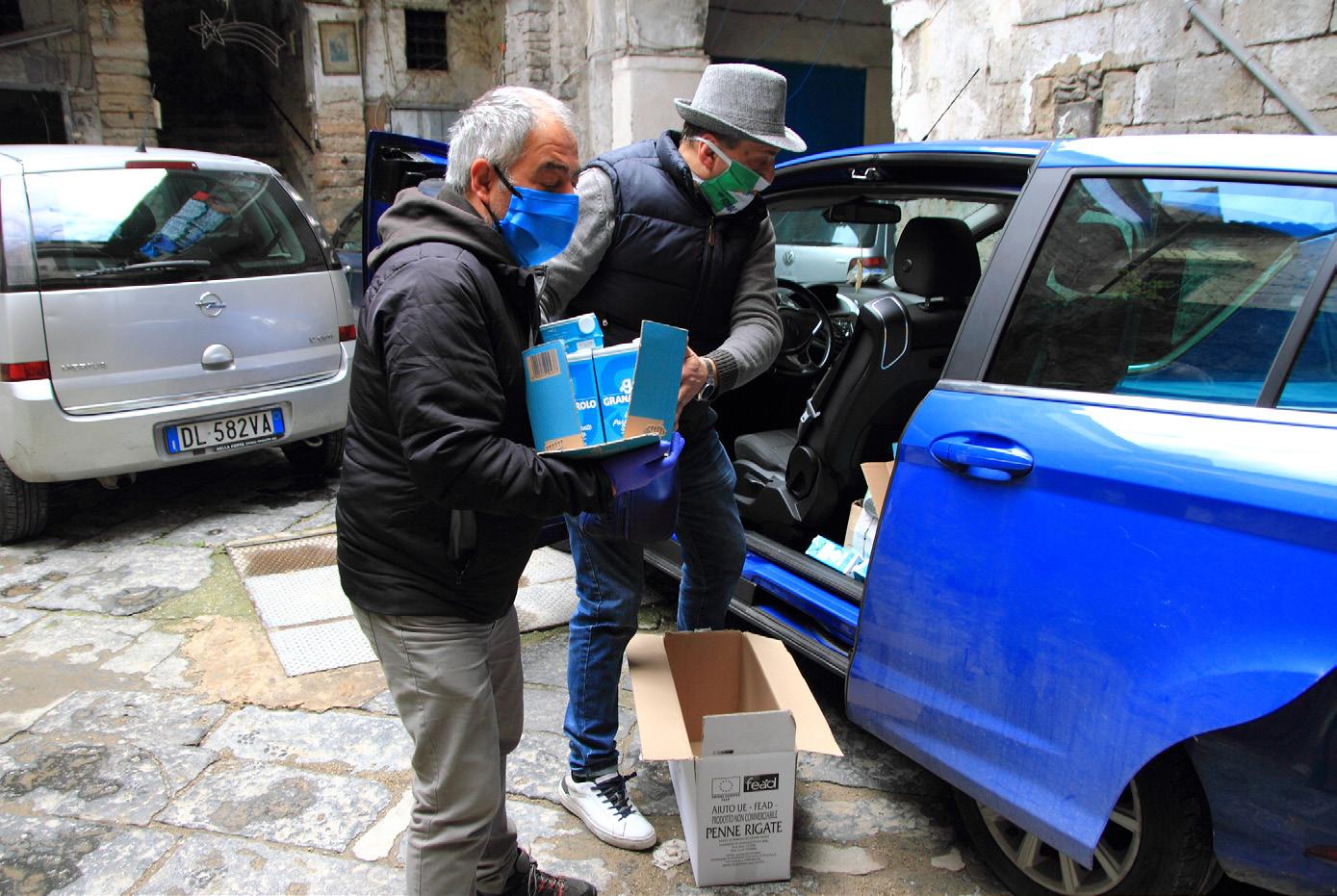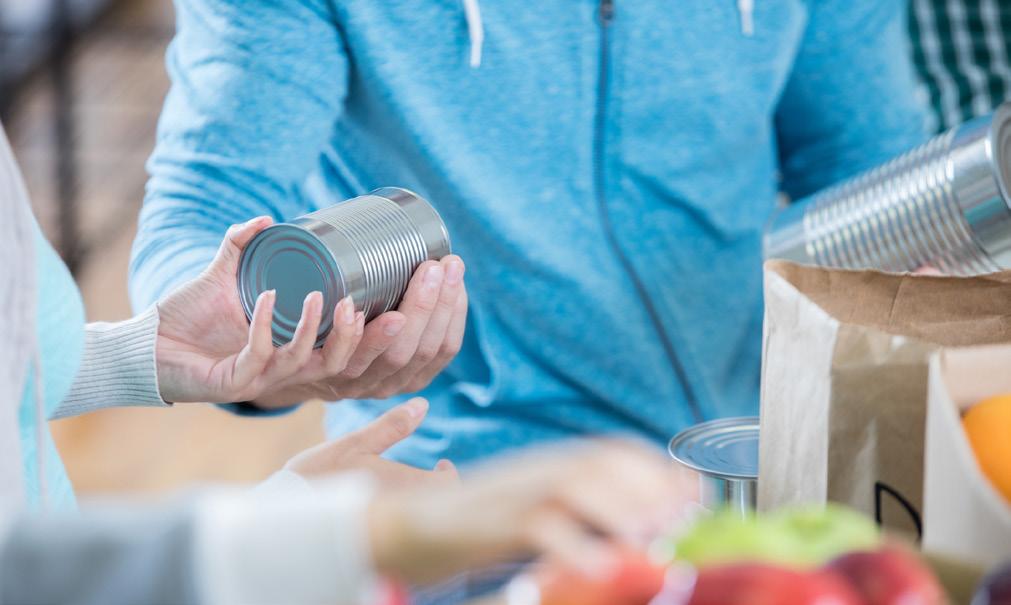
10 minute read
Food Banks and COVID: Generosity in a Time of Concern
ISTOCK
Since I started my job working for Many Rooms Church Community in October 2019, one of my regular tasks has been to help an elderly woman named Terry access the food bank. Terry is unable to walk long distances and often needs to be close to the bathroom. So, even though the food bank is only a few blocks away, I go for her. Every other Tuesday morning I walk over to her Manitoba Housing apartment building and take the elevator to her sixteenth-floor suite.
The view of the urban landscape overlooking Central Park from her suite is amazing, but the journey from the lobby to her suite is full of obstacles. Sometimes there is blood or vomit on the floor. Often I will ride the elevator up with someone who is high on something (maybe just weed, but probably something stronger). Apparently, cockroaches have been by David Guenther
spotted climbing up the wall in the elevator. Anyway, you get the picture.
But today, over and above my usual vigilance, I also have COVID-19 on the mind. An elevator with sick people, and it seems that many of the people in this building are often sick, is not a good place to be during a global respiratory pandemic.
Terry Fortunately for me I am the only one in the elevator on the way up. Terry hands me her signed letter which allows me to pick up her food and I also grab a few of her reusable grocery bags. We both know this part of the routine and it only takes a few minutes. The way down is a bit more crowded. Only three of us are in the elevator and, thankfully, no one is coughing.
It takes me only five minutes to walk quickly
across Central Park to Calvary Temple. I had thought about phoning ahead this morning to see what the new COVID protocols would be, but I didn’t. From the middle of the park I can already see people lining up outside the building. This is a good sign, since we usually gather packed into a waiting room with maybe 50 to 100 people. Today things are obviously different.
Mr. Cheerful As I wait in line our usual greeter starts pacing up and down the line and explaining the situation to people. He is a cheerful little fellow with a testimony of life on the streets. He’s seen rough times but has cleaned up now and appears to live a middle-class life. I don’t know his name since I’ve never introduced myself.
I’m reluctant to tell people working there who I am because I don’t want to be treated differently. One of the other leaders in our church has told me stories of being whisked to the front of the line once people knew she was from a church and getting food for someone else.
Despite his new life, Mr. Cheerful still has a great rapport with the people he serves. There is the usual funny banter, but today he is also delivering some bad news. Winnipeg Harvest donations are down. Regular middle-class people are stockpiling canned goods. Nobody wants to leave their homes to donate. They are

concerned about their own wellbeing. Grocery stores also have less food to donate as their sales are skyrocketing.
Ashley and Tyler I haven’t been waiting for long before I see some familiar faces. Ashley and Tyler, a young couple from our church, are there. I wave and they look a bit surprised to see me in the line. “This the line for the foodbank?” Ashley asks. I reply and want to ask how they’re doing, but they hurry off to the back of the line. They don’t want to be rude, but the line is growing fast. Tyler was recently laid off from his job. That was a couple of weeks before COVID started, but I’m sure it’s even harder to find a job now.
As we wait in line the early-birds start to trickle past us with their food bank items packed into their folding pull-behind carts. As usual everyone is grateful, but there is obviously some tension in the air. One man pulls Mr. Cheerful aside “privately,” but everyone standing in my section of the line can hear: “This wouldn’t last me even two weeks, never mind a month!” Another woman is smiling as she passes by and laughs to the man walking beside her, “Only one potato!”
As I wait I try to keep a safe distance from the others in the line. No one seems to be following the two-meter social distancing guidelines. Maybe they don’t know? Maybe they have bigger things to worry about and don’t care? The wait continues and I realize that I’m starting to feel chilled. My nose begins to drip and I avoid the urge to touch my face, feeling self-conscious even though no one in the line would care.
As the line rounds the corner of the building the wind also picks up. At least I’m almost at the door.
They’re letting us in one by one, opening and closing the doors for us, making sure no one has to touch the door handles.
A Month Once I’m finally in, the first surprise is that the next food bank won’t be for another month—April 21. I’m also told to pick a time slot to arrive. Next they pack the food into my bags. I had brought four or five, but it all fits into one. There is less than half the usual amount of food available to each person. There are also no choices, since that would mean having us handle the food. Altogether I’m in and out in less than five minutes.
On the walk back to Terry’s place I’m already thinking of how disappointing this will be for her. Half the amount of food that would usually last two weeks is now supposed to last her a full month. That’s essentially one quarter of the amount of food she usually lives off of. All because of COVID-19. I’m thinking about this as I take the elevator back up to her suite.
It’s 10 a.m. when I arrive back at Terry’s. The whole ordeal took only one hour. Terry is more awake than 8:45 a.m. Terry was. She also has her trusty cockatiel Ralphie perched on one shoulder when she opens the door. We get to unloading the food and I start explaining the situation to her. There’s less food, more people using the foodbanks, and the next foodbank isn’t for a month.
My Provider She’s disappointed, but also understanding. She knows about the virus and the havoc it’s causing. But she also knows something more important that I’m still learning. As I’m trying to reassure her about the ways our church could help if the foodbanks shut down she casually looks at me and says,
“It’s okay, Dave. I know who my Provider is.” And that’s when it hits me.
The people stockpiling canned goods and toilet paper don’t know, or have forgotten, who is their Provider. Their actions are driven by fear and I’m not sure if they realize the effect of their actions on the urban poor. I didn’t until today. Maybe I am one of “those” people. That makes

me ask the question: Does my own life show that I know who my Provider is? Do my actions in these stressful times back this up?
Years of being unable to provide for herself have taught Terry what it means to truly rely on God. I hope I can learn to be like her one day. I also hope that we will take the time to learn how our consumption affects the poorest members in our society. For people who want to act, food banks need donations and volunteers now more than ever.
Many of their loyal volunteers are seniors who are now, understandably, staying home due to the risks of COVID-19. But, young people are being encouraged to fill in for them in this time of need. Let’s show through our generosity in this time of fear that we are also learning who is our Provider.
For information on how you can help, check out your local foodbank online.

David Guenther, BA, serves as a resource pastor at Many Rooms Church Community (EMC). He and his wife Hannah live in Winnipeg’s Spence Neighbourhood and live in community with friends and family members. This article was submitted on March 24, 2020. David says, “You will notice that I have named a few of our church members who access the foodbank in this story. I want you to know that they’ve preread my draft and have generously given their consent for me to share their first names.”
by Layton Friesen Conference Pastor

Allow me a little sarcasm.*
Isn’t it wonderful that we live in Canada that’s so in love with Jesus! It makes it so much easier to be a Christ-follower. These days I can basically become like Jesus by drinking Canadian craft beer.
It was not always this good. Back sixty years ago, just to stay faithful to Jesus, Christians attended a poorly produced Sunday morning worship, Sunday School, Sunday night Christian Endeavour service, Wednesday night Bible Study, and Saturday morning prayer meeting. Just being a basic Christian took up gobs of time.
It takes so much less nowadays, and thank goodness because I have so much less time. In a society so deeply Christian as ours all I need is a quick drive-by at my favourite megachurch and that’s “discipleship.” At my super-church, there is a whole army of pastors, IT workers, and other technicians packaging my worship experience down to the second.
In other countries where its actually hard to be a Christian, church has to go small, with hard to find, disciplined house groups led more often than not by housewives. Thankfully, Canada is a Christian country.
In fact, our culture is so excited about the Kingdom of God that to only get to Sunday worship once or twice a month seems more than adequate. Whenever my kids have hockey, dance, or we had a busy Saturday, we can skip church because society itself naturally leads my children to follow Jesus anyway. I hear hockey locker rooms are practically a Sunday School these days.
Because our public schools so eagerly teach my children about being Christ-like, I don’t worry at all that my children will spend 16,000 hours in a public school and only about 360 hours in Sunday School. That’s a perfectly common sense arrangement because I know that public school affirms the church’s teachings on nonviolence, sexuality, abortion, and suicide.
And why now expect people to study the church’s theology? Let’s make church about
This Wonderful Christian Canada
experiencing the embrace of Jesus. Church should be about helping people accept themselves. All this teaching about atonement, judgement, and sanctification seems to assume that Christianity is some sort of narrow gate, some high, lofty path only a few will find. And teach history? Ethics? Philosophy? Get serious.
And because Canada is now so supportive of Christian faith I can give a mere token of my money to the church. Isn’t it sad that in some countries Christians actually have to forego Caribbean cruises because their churches get so little help from their government? If they want Christian camps, schools, colleges and mission organizations they have to give heaps of money to the church. We have a government that so eagerly gives summer job grants and tax exemptions to churches.
Or remember how we used to memorize Scripture? A Christian college professor complains to me that evangelical students now arrive on campus innocent of any meaningful Bible knowledge. How quaint! Someone tell Professor Fuddy-Duddy that in a society steeped in the Bible like ours, you show kids that Jesus thinks they’re super-special and they will end up disciples.
All sarcasm aside now. We don’t live in that kind of Canada and have not for a long time. Let’s get serious about being transformed into a band of trained, disciplined, spiritually intoxicated soldiers of Christ. *An improvisation on a rant by Dr. John G. Stackhouse, Jr., several years ago at Providence University College and Seminary. ISTOCK










